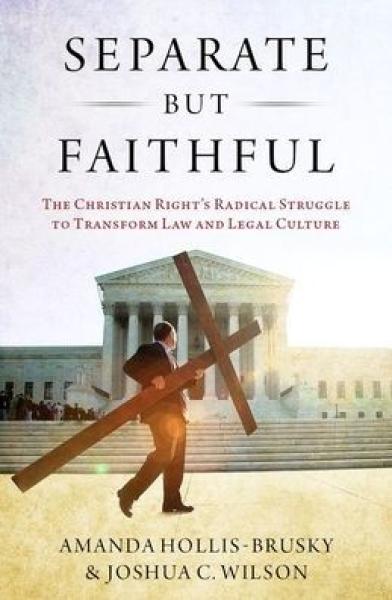Description
In Separate But Faithful, Amanda Hollis-Brusky and Joshua C. Wilson provide an in-depth examination of these efforts, including their causes, contours and consequences. Drawing on an impressive amount of original data from a variety of sources, they look at the conditions that gave rise to a set of distinctly Christian Worldview law schools and legal institutions. Further, Hollis-Brusky and Wilson analyze their institutional missions and cultural makeup and evaluate their transformative impacts on law and legal culture to date. In doing so, they find that this movement, while struggling to influence the legal and political mainstream, has succeeded in establishing a Christian conservative beacon of resistance; a separate but faithful space from which to incrementally challenge the dominant legal culture.
Both a compelling narrative of the rise of Christian Right lawyers and a trenchant analysis of how institutional networks fuel the growth of social movements, Separate But Faithful challenges the dominant perspectives of the politics of law in contemporary America.
"While the Christian Right has long voiced grave concerns about the Supreme Court and cases such as Roe v Wade, until recently its cultivation of the resources needed to effectively enter the courtroom had paled in comparison to its efforts in more traditional political arenas. A small constellation of high-profile leaders within the Christian Right began to address this imbalance in earnest in the pivot from the 20th to the 21st century, investing in an array of institutions aimed at radically transforming American law and legal culture. Separate but Faithful is the first in-depth examination of these efforts - their causes, contours and consequences. Drawing on an impressive amount of original data from a variety of sources, the book examines the conditions that gave rise to a set of distinctly "Christian Worldview" law schools and legal institutions. Further, the book analyses their institutional missions and cultural makeup and evaluates their transformative impacts on law and legal culture to date. Separate But Faithful finds that this movement, while struggling to influence the legal and political mainstream, has succeeded in establishing a resilient Christian conservative beacon of resistance; a separate but faithful space from which to incrementally challenge the dominant legal culture by training and credentialing, in the words of Jerry Falwell, "a generation of Christian attorneys who could...infiltrate the legal profession with a strong commitment to the Judeo-Christian ethic.""--
This fascinating book reveals how Christian Right legal activists built and deployed new law schools, litigation-support organizations and lawsuits in an attempt to radically transform American law-and how, although they fell short of this goal, they succeeded in others. An important book, carefully researched, abundantly documented, and startling in its implications. -Charles Epp, author of The Rights Revolution and Making Rights Real
Separate But Faithful is a fascinating, exhaustively researched, and highly readable story of the rise and challenges faced by three ultraconservative religious law schools-Ave Maria, Liberty, and Regent-and their mission driven faculty and students. It is also theoretically rich, focusing especially on 'support structure' theory in relation to social movements and law, and full of insights about legal hierarchies, the structure of legal education, and the role of law in social change. In short, it is a superb contribution as narrative and theory-builder. -Bryant Garth, Distinguished Professor of Law Emeritus and Co-director, Center for Empirical Research on the Legal Profession, University of California-Irvine, and Affiliated Scholar and Director Emeritus, American Bar Foundation
Hollis-Brusky and Wilson's book, Separate But Faithful, is a comprehensive account of a legal movement on the rise, and one that has obtained significant positions of authority in government, including the courts. Their book is a must read for those seeking to understand the direction of the courts and the law, and how legal change happens. -Leah Litman, Assistant Professor of Law, University of Michigan Law School, and co-host of the Supreme Court podcast Strict Scrutiny
Product Details
- Oxford University Press, Brand
- Oct 15, 2020 Pub Date:
- 0190637269 ISBN-10:
- 9780190637262 ISBN-13:
- 312 Pages
- 9.3 in * 6.2 in * 1.1 in Dimensions:
- 1 lb Weight:




